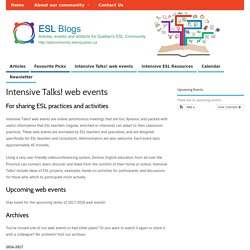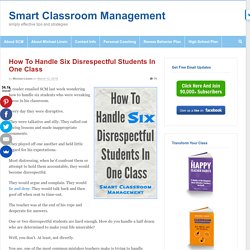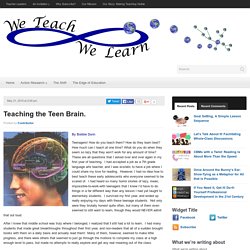

Intensive Talks! web events – ESL Blogs. For sharing ESL practices and activities Intensive Talks!

Web events are online synchronous meetings that are fun, dynamic and packed with useful information that ESL teachers (regular, enriched or intensive) can adapt to their classroom practices. These web events are animated by ESL teachers and specialists, and are designed specifically for ESL teachers and consultants. Administrators are also welcome. Each event lasts approximately 45 minutes. Using a very user-friendly videoconferencing system, Zenlive, English educators from all over the Province can connect, learn, discover and share from the comfort of their home or school. Upcoming web events Stay tuned for the upcoming series of 2017-2018 web events! Archives You’ve missed one of our web events or had other plans? 2016-2017A Glimpse into the Intensive ESL ClassroomStrategies in the ESL ClassroomMaking C2 Work in the (Intensive) ESL ClassroomMaking C3 Work in the (Intensive) ESL Classroom 2015-2016Making C1 Work! A Crash Course In EVIDENCE BASED TEACHING.
How To Handle Six Disrespectful Students In One Class. A reader emailed SCM last week wondering how to handle six students who were wreaking havoc in his classroom.

Every day they were disruptive. They were talkative and silly. They called out during lessons and made inappropriate comments. They played off one another and held little regard for his expectations. Most distressing, when he’d confront them or attempt to hold them accountable, they would become disrespectful. They would argue and complain. The teacher was at the end of his rope and desperate for answers. One or two disrespectful students are hard enough. Well, you don’t. You see, one of the most common mistakes teachers make is trying to handle difficult students as distinct entities, separate from the class as a whole. Day after day, this teacher was pulling them aside for one-on-one talking-tos. He set up behavior contracts, offered rewards in exchange for good behavior, and had consequences designed just for them. They cause resentment and antagonism. Then defend it to the hilt. Workshops. Collaborative Writing Today’s students should be in the center of the teaching and learning process.

Making room to collaborative writing will engage your students in an authentic project. Therefore requiring greater precision in the editing process. The web tools make it easy and possible for students to expand their creativity with peers, transfer what they’ve learned and share their work with an enlarged audience. We will guide you through a collaborative writing experience during the workshop, so don’t (...) Using Interactive Surveys In this workshop, we will present various pedagogical approaches to use with interactive surveys. Digital Storytelling Come and experiment digital storytelling with us. Gamification in the Classroom Gamification, if planned carefully, has been proven to be an effective method to increase student motivation and engagement. Using the IWB in ESL. Mes 4 capsules pour résumer la méta-analyse «Visible Learning» de John Hattie. Internet TESL Journal (For ESL/EFL Teachers)
Pinterest. Teflpedia. Students with Exceptionalities - Part 1: The Usual Villains. Teaching the Teen Brain. By Bobbie Dunn Teenagers!

How do you teach them? How do they learn best? How much can I teach at one time? What do you do when they seem so lazy that they won’t work for any amount of time? After I knew that middle school was truly where I belonged, I realized that I still had a lot to learn. I did what I could throughout my first couple of years, but I knew that I was doing what many teachers fall into the habit of doing. The good news is that brain research is becoming so established that it is now full of information to help middle school teachers learn about the adolescents they call students. According to Brownlee, Hotinski, Pailthorp, Ragan, and Wong (1999), the authors of “Inside the Teen Brain,” the adolescent brain is still creating “the connections between neurons that affect not only emotional skills but also physical and mental abilities.” Adolescents are very capable of learning and behaving, as long as we keep our expectations clear and enforce them consistently.
50 Inspiring TED Talks For Teachers: An Updated List For 2014. 50 Inspiring TED Talks For Teachers: Updated For 2014 by Sara Briggs The communication explosion reaches its peak when you explore the endless avenues running through TED Talks.

Moreover, the title educator embodies many forms within these talks. So it’s precisely for this reason that any educator benefits from so many of these talks. Each speaker reveals his or her passion of a view or a subject with the enthusiasm of a first-year teacher. Using TED Talks to convey an important message or spark creativity might be more effective in teaching students than an individual agenda or preconceived notion of what should be said. These are the best TED Talks for any educator because they make us laugh, warm our hearts, break down barriers, and always inspire us to dig a little deeper and push a little harder, challenging your educator perspective. 1. 100,000 Tutors 2. Sugata Mitra won the 2013 TED Prize for his idea: Build a school in the cloud. 3.
Bill Gates - Teacher of the Year. ESLvu.